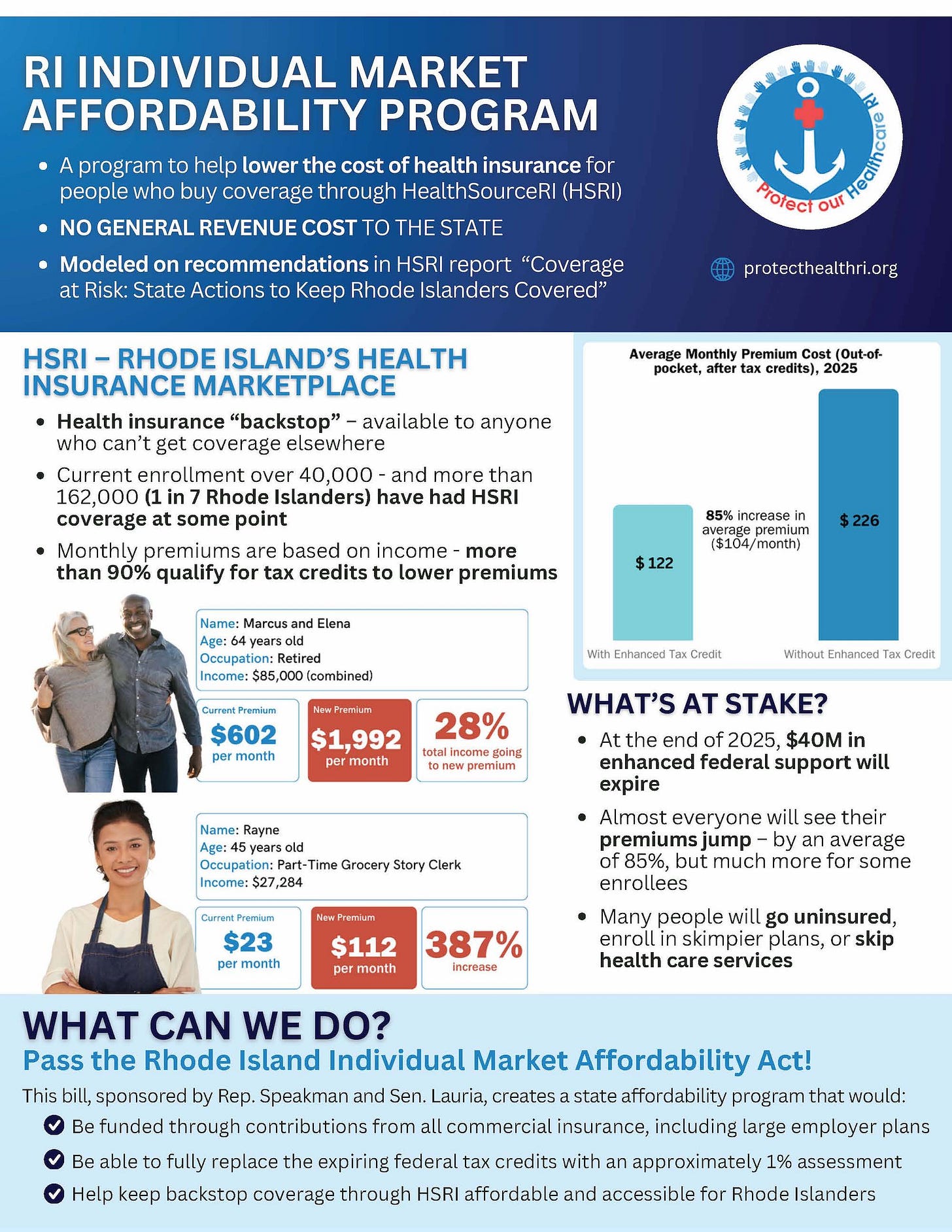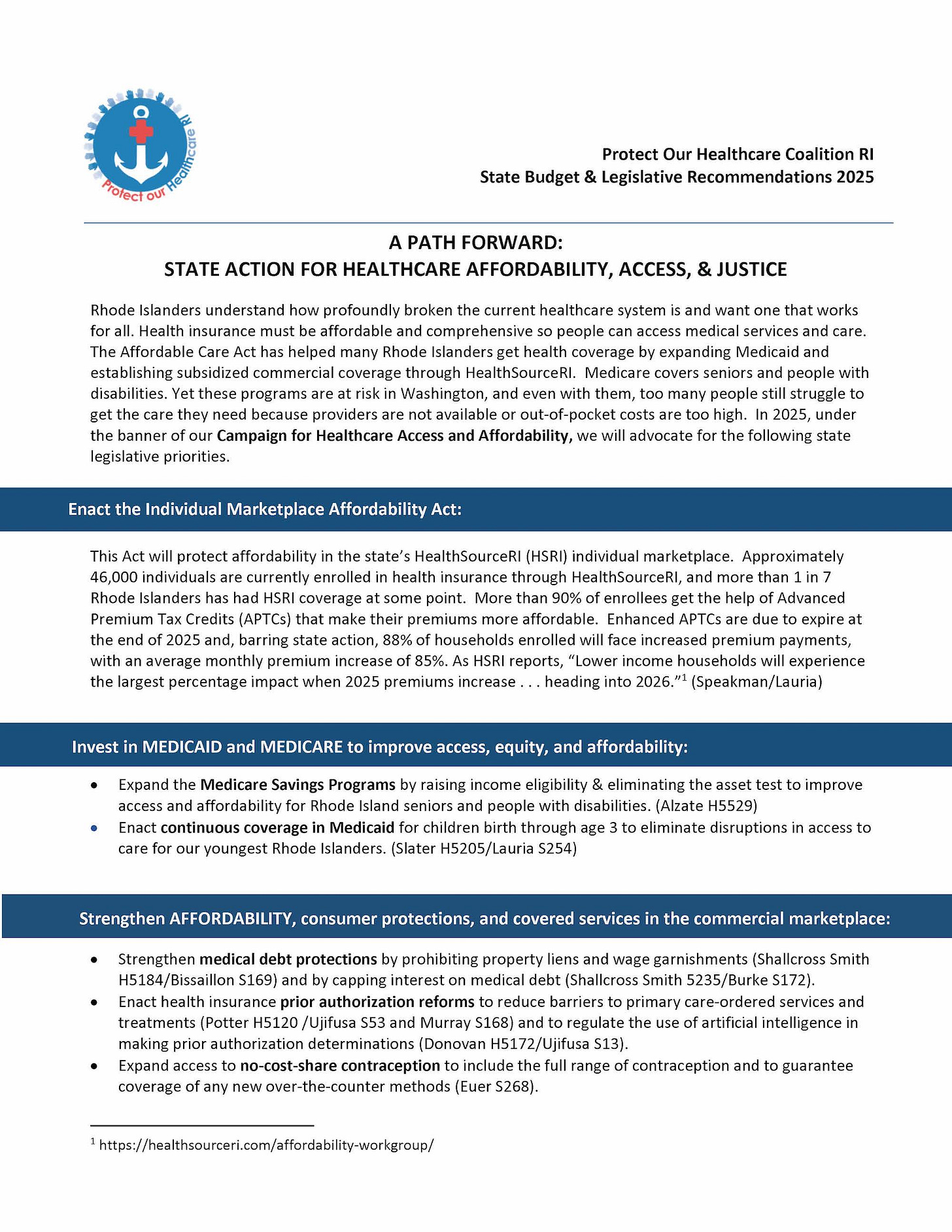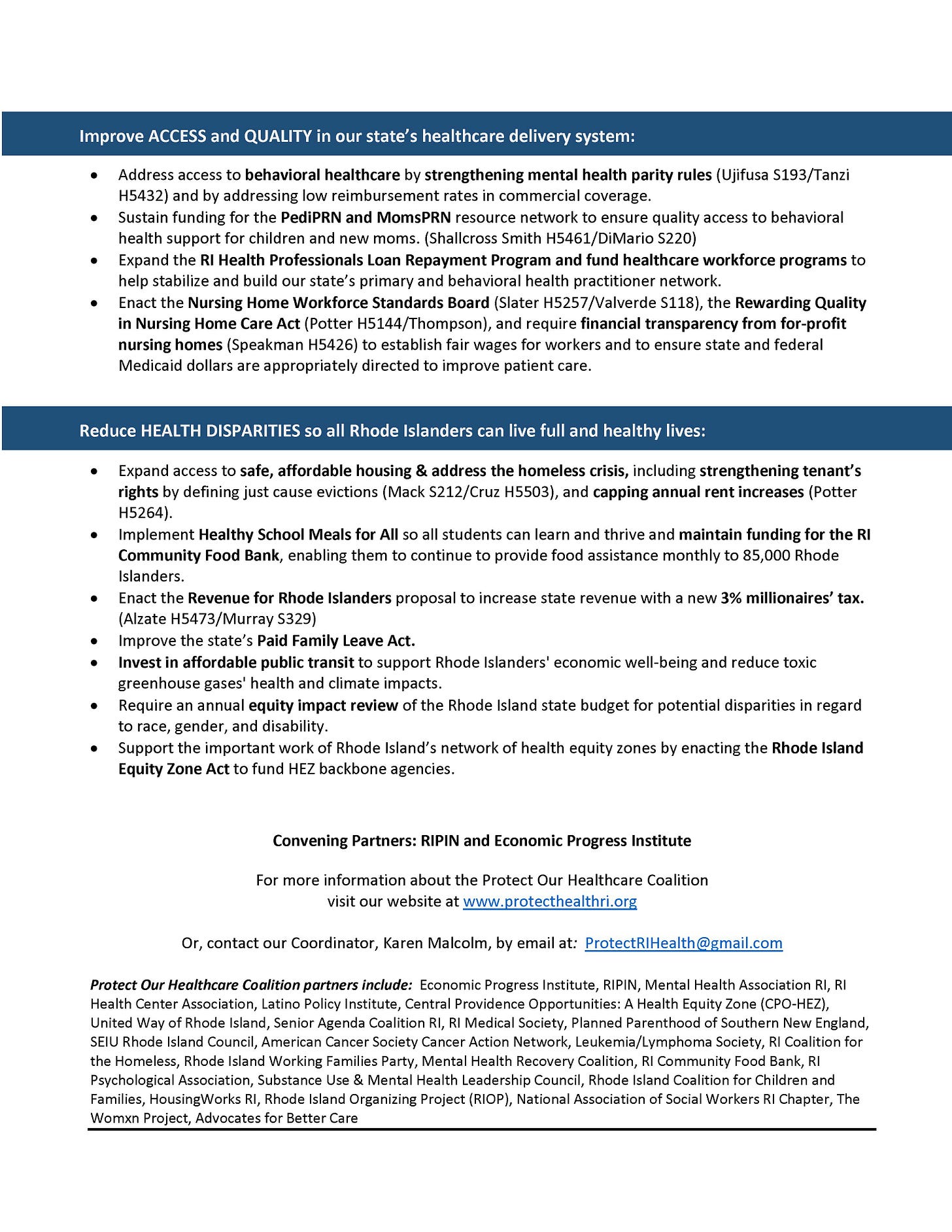With federal support uncertain, the Protect Our Healthcare Coalition presents a path forward for the State
"The policy recommendations outlined today will help protect Rhode Islanders and safeguard their access to lifesaving healthcare."

Healthcare advocates with the Protect Our Healthcare Coalition1, a group of leading consumer and non-profit organizations, kicked off their state legislative campaign at an event titled “A Path Forward – State Action for Healthcare Access, Affordability, and Justice.”
“Right now, in Washington, Congress is moving through a budget resolution and reconciliation process that, if successful, will cause irreparable harm for Rhode Island. The proposal includes potentially billions of dollars in cuts to Medicaid and other critical programs that Rhode Island families depend on, to pay for more tax cuts for corporations and the wealthy,” stated Nina Harrison, Policy Director at the Economic Progress Institute and co-chair of the Coalition. She continued, “Here in Rhode Island, we need to step up and create a path forward! The policy recommendations outlined today will help protect Rhode Islanders and safeguard their access to lifesaving healthcare.”
Here’s the video:
Shamus Durac, Senior Attorney / Health Policy Analyst at RIPIN and the Coalition’s co-chair, outlined a new proposal to shore up HealthSourceRI (HSRI), the Rhode Island health insurance individual marketplace. After the expected loss of nearly $40 million in federal assistance to Rhode Islanders when the current enhanced premium tax credits that subsidize health insurance premiums expire at the end of 2025.
The Rhode Island Individual Market Affordability Act, sponsored by Representative June Speakman and Senator Pam Lauria, is based on recommendations in the January 2025 HSRI report “Coverage at Risk: State Actions to Keep Rhode Islanders Covered.”
As Durac noted, “HSRI provides health insurance for Rhode Islanders who aren’t eligible for other forms of coverage and has served more than 1 in 7 Rhode Islanders since 2013. More than 90% of enrollees get financial assistance with their premiums, and these enrollees will see significant premium increases (averaging 85%, but as much as 386% for some lower-income enrollees) when federal enhanced premium tax credits expire. This proposal will create a State program to replace that lost federal funding, and will help avoid the much higher premiums and coverage losses that would otherwise occur.”
Durac also outlined recommendations to address medical debt and health insurance prior authorization denials that impact Rhode Islanders, noting, “For most Rhode Islanders, a health insurance card in your pocket doesn’t always mean healthcare is accessible. Too many Rhode Islanders struggle with high deductibles and copays, and insurance barriers persist. These bills are a path forward on affordability and access.”
Michaela Carroll, a Health Policy Associate at Rhode Island Kids Count, presented several recommendations to address the ongoing primary care crisis and support those covered by Medicaid and Medicare.
“When we improve care for our most vulnerable populations, we improve it for everyone,” said Carroll. Included in the recommendations Carroll outlined, was the proposal for continuous Medicaid coverage for infants and toddlers under age 3 (Slater H5205/Lauria S254) to ensure our youngest Rhode Islanders do not lose their coverage due to paper work burdens; the proposal to expand the State’s Medicare Savings Program to help seniors and people with disabilities with their Medicare costs (Alzate H5529); and the bill to enact a State Nursing Home Workforce Standards Board (Slater H5257/Valverde S118) to ensure fair wages for workers and that Medicaid dollars are appropriately directed to improve patient care, among other measures.
Dominique Resendes, representing Central Providence Opportunities: A Health Equity Zone, discussed the issue of social determinants of health and the current federal attacks on equity and access to programs and services.
“The issues we are facing in Rhode Island’s healthcare system are not just about affordability and access, but also about equity,” said Resendes. “We know that our ability to lead healthy lives is determined by where we live - not just by our experiences at the doctor’s office. To be healthy, we need nutritious food, clean water, safe, affordable housing, decent public transportation, and strong connections with our communities. That’s why issues like housing, food, and transportation are represented in the Protect Our Healthcare Coalition’s legislative recommendations as a path forward for every Rhode Islander, and why we are a proud partner in the Coalition.”
The Coalition shared the story of Penny Fitch, a Newport resident whose decades of experience struggling to afford and access healthcare represents the struggles most Rhode Islanders share. She highlighted a time when she lived with no health insurance at all and her struggles today with long waits for needed appointments and high out-of-pocket costs, saying: “Even now, with Medicare, I was hospitalized for nine days last April. When the bill came in, it was $4,000. I did everything but cry. $4,000 to us is almost unbelievable to come up with. We scrimped and saved every little bit we could and my husband took on extra work on weekends to get it paid off quickly, because we know what it’s like to live with medical debt and we wanted to get out from under it.”
In her remarks, Representative June Speakman reflected on the uncertainty facing Rhode Island and the nation today. “What’s happening in Washington is exacerbating inequities and pushing more Rhode Islanders into financial distress. As elected leaders, we have the responsibility to push back and to make Rhode Island a leader in doing all we can to meet the health care needs of our residents. My bill, the Rhode Island Individual Marketplace Affordability Act, and other recommendations supported by the Protect Our Healthcare Coalition, are a path forward to ease costs, improve access, and stabilize our workforce, despite what’s happening in D.C.”
The Protect Our Healthcare Coalition’s legislative recommendations:
Protect Our Healthcare Coalition partners include: Economic Progress Institute, RIPIN, Mental Health Association RI, RI Health Center Association, Latino Policy Institute, Central Providence Opportunities: A Health Equity Zone (CPO-HEZ), United Way of Rhode Island, Senior Agenda Coalition RI, RI Medical Society, Planned Parenthood of Southern New England, SEIU Rhode Island Council, American Cancer Society Cancer Action Network, Leukemia/Lymphoma Society, RI Coalition for the Homeless, Rhode Island Working Families Party, Mental Health Recovery Coalition, RI Community Food Bank, RI Psychological Association, Substance Use & Mental Health Leadership Council, Rhode Island Coalition for Children and Families, HousingWorks RI, Rhode Island Organizing Project (RIOP), National Association of Social Workers RI Chapter, The Womxn Project, Advocates for Better Care






